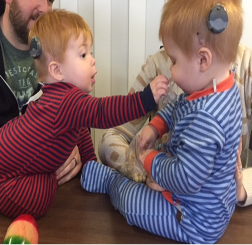Overview

The twins are identical in every way — including their hearing loss. Meet Oliver and Judah.
The Audiology Department at Rady Children’s offers a full range of evaluation and rehabilitative services for young children and adults with hearing disorders and differences. Audiology services for child’s hearing include a highly successful Cochlear Implant Program to help with pediatric hearing loss as well as a Balance Clinic, both staffed by a multidisciplinary team. These services from our healthcare professionals help with a variety of issues for patients, including young children with hearing problems and pediatric hearing loss. We Our pediatric audiologists also offer hearing aid and assistive listening device evaluations and fittings for patients.
Our Audiology Department team of healthcare professionals works closely with the Speech-Language Therapy Department and Developmental Evaluation Clinic to ensure that patients with any hearing differences associated with spoken language communication are identified and treated early with care. In addition to helping with hearing and communication disorders, our pediatric audiologists also work with several other specialties including Otolaryngology (Ear, Nose, and Throat); Genetics; and Hematology/Oncology.
For many parents of kids who have hearing and communication disorders and need hearing protection, the development of spoken language by their child is important. To help meet this goal, we need to identify atypical hearing thresholds and begin audiological services as early as possible for the child. Waiting to identify reduced hearing thresholds can create a delay in the development of spoken speech and language for young children and can lead to hearing problems. It is our goal to provide early identification of hearing differences and provide treatment options for each child we evaluate at our center
Here are some signs that your child may have atypical hearing:
- If your child talks in a very loud or very soft voice, this might mean something is wrong with your child’s hearing.
- Seems to have difficulty responding when called from across the room, even when it is for something interesting.
- Turns their body so that the same ear is always turned toward sound.
- Is 3 years or older and has difficulty understanding what has been said or following directions.
- Often asks “What?”
- Has speech that is difficult to understand.
- Doesn’t startle when there are loud noises.
- Has small or deformed ears.
- Does not develop sounds or words that would be appropriate at their age. (See Hearing Milestones for more information.)
For Referring Physicians
Please print and complete the Developmental Services Prescription Form.
Girl Scout-Earned Patch on Hearing Protection